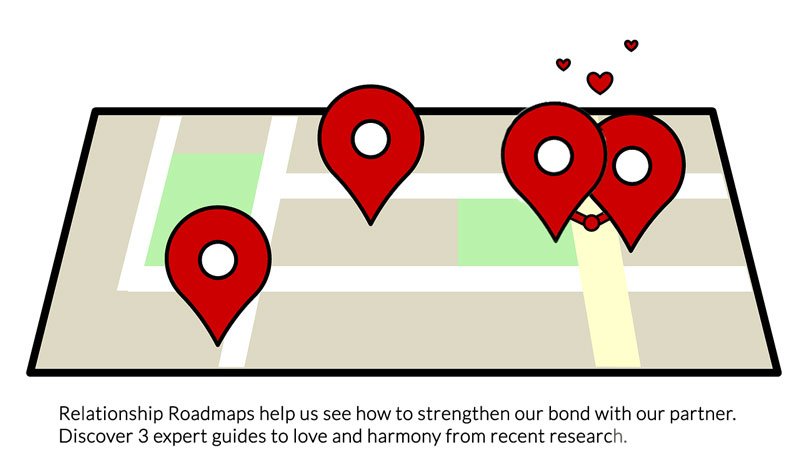
Why do our best efforts to talk to each other seem to backfire sometimes?
One reason is human nature – our brains are quick to judge to explain what we see (“My partner is stubborn”) rather than discuss to discover underlying needs (“Why does my partner say that?”). Discussion is the skill we need because it removes those assumptions that work against us when tending our relationships. But it’s complicated!
Research has made much progress recently in revealing how healthy relationships work, and what causes trouble. Several relationship therapy experts have developed images and maps to convey their best ideas. While there is no ‘silver bullet’ to fix problems or resolve distress, having a visual aid helps a lot.
Seeing a process when trying something new can encourage us to explore a different direction and take the first steps toward healing. Here are three ‘maps for well-being’ and links where you can find out more.
Dan Siegel’s Healthy Mind Platter
Dan Siegel is co-author of the instrumental book, Parenting from the Inside Out. Siegel reveals to us the link between secure attachment and the healthy brain and body development of the child. He helps parents foster well-being in their children by better understanding their own upbringing first.
The powerful idea that Siegel gives us is this: we can free ourselves from negative patterns we learned in our own formative years. We have the ability to shape the way our own brain works, by focusing our attention on our own thoughts, feelings, and actions, and choosing different ways of responding. Our brains can learn new patterns of thought, feeling and action that increase the harmony we enjoy inside ourselves and with others.
How can we help ourselves nurture the brain’s ability to find harmony? The “Healthy Mind Platter” is Siegel’s map to describe habits that strengthen greater well-being, for ourselves and our relationships. Every day, a healthy brain needs some time devoted to each of these activities for well-being:
- Focus Time –goal-oriented thinking, which helps form connections deep in the brain
- Play Time – spontaneous, creative experiences fostering new brain connections
- Connecting Time –taking time to bond with other people and the natural world
- Physical Time – moving and strengthening our bodies
- Time In – reflecting on our own thoughts and feelings
- Down Time – letting thoughts wander, putting goals aside
- Sleep Time – getting the rest we need
Find out more:
Dan Siegel’s Healthy Mind Platter
Sue Johnson’s Seven Conversations
Sue Johnson’s highly successful counseling approach, Emotionally Focused Therapy (EFT) helps partners overcome even great distress to form deeply supportive bonds.
A couple’s power to love and understand each other grows stronger through defining moments of dialog. Helping partners shape these dialogs is what Sue Johnson’s work is all about. EFT counseling helps partners work together to soften their discussion, in order to discover the deeper needs that each person is bringing to the other for help. The process takes place over seven transforming conversations. She gives us a condensed version of the EFT road map in her book Hold Me Tight: Seven Conversations for a Lifetime of Love.
Johnson’s relationship roadmap to seven transformative conversations:
- Recognizing Demon Dialogs – Identify the angry and hurtful things said between you that derail efforts toward healing conversation
- Finding the Raw Spots – Beneath the impulsive reactions, what raw nerves are hurting?
- Revisiting a Rocky Moment – Create a base of emotional safety and use it de-escalate a difficult conflict.
- Hold Me Tight – Dialog has deepened understanding, and partners are able to open up more fully, and respond emotionally to each other
- Forgiving Injuries – Soothe the injuries to the partnership by facing them together and forgiving them
- Bonding through Sex and Touch – Partners find new trust in each other and enjoy closer emotional and physical intimacy
- Keeping Your Love Alive – Couples mindfully turn toward each other for connection again and again.
Find out more:
Dr Sue Johnson’s Book: Hold Me Tight
Dr. John Gottman’s 4 Horsemen of Disaster and 7 Principles for Making Marriage Work
Drs. John and Julie Gottman are world-renowned for their studies showing how the quality of couple’s interactions can be used predict stability of their relationship. He found four behaviors that he called “the four horsemen of the apocalypse” that spell deep trouble. The model helps identify whether the couple’s conflict management skills put them at high risk for divorce or relationship failure.
The four horsemen that drive a partnership toward disaster are:
- Criticism
- Defensiveness
- Contempt
- Stonewalling
(More about them here: http://www.gottmanblog.com/four-horsemen/2014/10/29/the-four-horsemen-the-antidotes).
Can couples manage conflict in ways that heal instead of hurt their relationship? Yes, absolutely, says Gottman. His book, The Seven Principles for Making Marriage Work, explains his set of tools for managing conflict productively.
This model for interaction helps couples find ways to build fondness, trust and safety – even through conflict:
- Build Love Maps: How well do you know your partner’s emotional world? Update your ‘map’ by asking your partner open ended questions – know what is happening in his or her daily experience. Note: Preferences and feelings do change. It’s okay to check and see if your map is up-to-date.
- Share Fondness and Admiration: We know that contempt is a red flag for long-term love. Fuming about our partner’s missteps can become an automatic reaction. Try to look for what your partner is doing right – and appreciate it. This tones down contempt and turns up feelings of appreciation, fondness and respect.
- Turn Towards: Our partner opens many quiet doors, throughout the day, that offer a chance for emotional connection. We have the choice to turn away, or go through them at any given moment. What can we do today to be more aware of our chances to turn towards our partner to hear or understand better?
- Let Your Partner’s Perspective Influence Yours: Hijacking a decision that effects both of you is a recipe for disaster. Harmonious couples consider each other’s feelings and respect each other’s different points of view. Let something from your partner influence you in a positive way, and see how that shapes your decisions together.
- Manage Conflict – Learn how to listen to each other and find ways to solve problems that can be solved, and keep your commitment to your relationship a priority for times when you ‘agree to disagree’.
- Overcome Gridlock to Disclose Your Dreams: The chance to pursue your dreams and adventures needs deliberate attention. Unfulfilled life goals can cause dialog between couples to fall into gridlock – it’s a sign that something important is not being recognized. Making life dreams come true is rewarding work. The chance comes as partners encourage each other to speak from hopes and aspirations.
- Create Shared Meaning: There are fortunate partners who build a life full of meaning together. They may have a unique family culture. They may talk about a shared philosophy of life, and family rituals they enjoy. The relationship has its own richness, beyond raising a family.
Find out more:
Review Article: http://psychcentral.com/blog/archives/2012/01/08/7-research-based-principles-for-making-marriage-work/
Gottman Blog: https://www.gottman.com/shop/7-principles-for-making-marriage-work-2/
Let the Journey Begin
These are just some of many new developments in relationship research. They give counselors new treatment approaches, and couples new tools that can help everyone when dealing with strong emotions and relationship challenges.
All couples argue. We all face stress. It’s normal, and it’s okay. What’s important is the way we learn to handle and discuss our difficulties. Applying these maps and ideas to real life isn’t easy. But with determination and guidance, we can live more harmoniously, by learning new positive ways to interact and take care of ourselves.
Share the Journey
If you’ve read this far – wow! Share your knowledge by tweeting, liking or giving a plus.
- (P.S: Subscribe to this blog so you get the next update instantly in your inbox)


